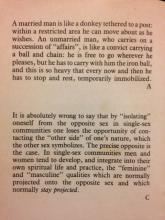What Happens When You Stop "Holding the Contradiction"?
Why Triratna Cannot Support Insight
Triratna (formerly The FWBO) is one of the largest Buddhist-inspired new religious movements operating in the West.
I left after two years
I have spent 2 years practising with Triratna in the UK, and have finally walked away after months of deliberations.
Independent Critique of Triratna's Whitewashing Terminology Concerning Sexual Abuse

"At the DBU member congregation at the end of April 2018 in Germany, Munisha, who was invited officially by the DBU council to teach on Safeguarding, introduced herself as a Safeguarding Officer of Triratna, while in fact she spoke more from the perspective of a PR spokesperson of the Triratna Buddhist Order (TBO). She basically whitewashed the history of the TBO, making the audience at one point even laugh about the victims whom she called “lovers”. The audience laughed when Munisha presented in a slide the record that Sangharakshita had 1.41 “lovers per year”. The pain of those whose faith and openness, whose spiritual quest has been betrayed must exist in another world – far far away or somewhere in this number 1.41. Munisha used a language that not only sought to normalise abuse but to deflect the audience’s attention from it . . . As a witness with some background knowledge, I found Munisha’s entire presentation an ugly feat of whitewashing and propaganda which really caused me pain just hearing it."
Paper on cult-like tendencies in the NKT

Here is an important paper by psychologist Michelle Haslam reflecting on her time spent practising with the New Kadampa Tradition (and a few references to Triratna thrown in). Reading through the paper may be a useful detox for those who have recently (or not so recently) exited Triratna since many of the negative patterns of thought and behaviour are shared by both movements. In particular we noted these similarities, sometimes paraphrased and sometimes listed here in direct quotes from the text:
1. "Under the highly polished surface lies ingrained sectarianism and a disparaging view of all other forms of spirituality; an expansionist drive that uses the energy of new recruits to spread the message with no concern for their burnout."
2. "a cultish dependency on the word and approval of the leader and an abdication of critical thought that is actively encouraged."
3. Both organisations are populated by "hero-narcissists" who play into a sense of group grandiosity. We can see this in Triratna's slogan "What the World Needs" (i.e. more Triratna).
4. Neither organisation offers the Buddha Dharma but highly idiosyncratic takes on Buddhism developed by their founders, i.e. the "Kadam Dharma" and the "Triratna Dharma Life" (aka the "particular presentation").
5. Haslam says, "Despite being a psychologist, and an atheist, and working full time outside of the centre, I am now shocked at the extent that I came to believe some of the teachings and to act accordingly." Aren't we all!?
6. "on top of the abusive experience experienced within the group, the wider community is likely to abandon you or emotionally neglect/invalidate you at a time of distress." As happened to Mark Dunlop and other whistleblowers in Triratna.
7. "Many survivors have reported that their friends who were not NKT members had more empathy and were more friendly than their NKT friends." One instance of this in Triratna springs to mind when an Order member friend of ours needed overnight accommodation when visiting a dying friend (also an Order member). One local community (that he had previously lived in for many years) refused to put him up on account of certain "views" he was supposed to hold.
8. "The teacher is . . . regarded as an embodiment of the moral and spiritual dimensions of Buddhist teachings. It is this ideal that underlies the role of teacher as exemplar and shapes the asymmetrical charismatic relationship between a teacher and his students. Such idealisation often leads a student to experience strong emotional attachment, with feelings that parallel those associated in Western culture with romantic love. This can lead to self-abandonment and glorification of the other."
9. "The member may feel as if the practises are ‘working’ for them due to indoctrination, fervor (infatuation and awe), emotional contagion, group narcissism, sense of belonging to a group, and love-bombing through the suggestion that they are all developing positive karma or ‘merit’."
10. "Believers are often extremely protective of their movement and deeply angered when it is questioned or insulted. Increased anxiety in attachment relationships is thought to increase hostility towards out-groups."
Letter from a friend

"…you can help a friend or relative in a high-demand group simply by engaging with them as if they are a full and rich person with their own ideas and autonomy. The work of Alexandra Stein suggests that modelling secure attachment is key to healing. Steve Hassan’s work suggests that appealing to a person’s “pre-cult” self can be very effective. A friend did that for me once with a letter. He helped free a part of me that had been locked up."
Matthew Remski in http://matthewremski.com/wordpress/whats-behind-the-blowback-youll-get-w...




